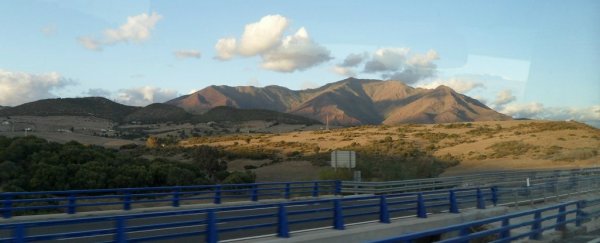In December 2015, 195 countries from around the world gathered in Paris to set guidelines and goals for dealing with global warming. Known as the Paris Agreement, these countries created a long-term plan to keep temperatures from rising more than 2 degrees Celsius (3.6 degrees Fahrenheit).
Now, using climate models and historical data, a team of researchers from France has tested the upper limit of that threshold to see what would happen in the Mediterranean if those limits were reached.
In the end, they found evidence that if temperatures happen to climb 2 degrees Celsius (3.6 degrees Fahrenheit) southern Spain would transform from a forest to a desert, drastically changing the region's biodiversity and possibly triggering a mass exodus of migrants seeking climate refuge.
"The Paris Agreement says it's necessary to limit global warming to 2 degrees Celsius (3.6 degrees Fahrenheit), if possible 1.5 degrees [2.7 degrees Fahrenheit]," co-author Joel Guiot, from the French National Centre of Scientific Research, told Frank Jordans at the Associated Press.
"That doesn't seem much to people, but we wanted to see what the difference would be on a sensitive region like the Mediterranean."
The team was drawn to this region in particular because it has long been a cultivated area in human history.
They note that many different human civilisations have called the region home – including the Greeks, Egyptians, and Romans – so understanding how climate change might play a role there in the future is, according to the team, a good place to start.
For their study, the researchers used historical pollen data to analyse how the Mediterranean region has changed over the last 10,000 years, which basically gave them a benchmark to build climate models off of.
With that in place, they created complex computer models that took into account various levels of greenhouse gases in the atmosphere, allowing them to analyse how the region would change if temperature levels increased by different amounts.
After crunching all of the numbers, the results were pretty damning. The team found that if global temperatures stayed the same as today – about 1 Celsius (1.8 Fahrenheit) higher than pre-industrial times – the Mediterranean wouldn't shift all that much in terms of biodiversity.
But if the temperature should increase 2 degrees Celsius (3.6 degrees Fahrenheit) – the threshold set by the Paris Agreement – the region would completely change because drought would likely take hold, eventually turning the forested area into a desert that would dramatically impact the area's current ecosystems.
"A 2 degrees Celsius warming, however, is likely over the next century to produce ecosystems in the Mediterranean basin that have [an] analogue in the past 10,000 years," the team writes.
That statement means that a rise in temperature would produce an ecosystem that has no historical evidence of ever happening in the region before. In other words, it would seriously hurt everything living there.
Even crazier, the team's study didn't account for the actions of humans in the region, such as deforestation and overly intense agricultural practices, which can both negatively impact the overall ecosystem. It stands to reason that these practices would only make the situation worse.
"If anything, human action will exacerbate what the study projects, and it could turn out to be too optimistic," Guiot told the AP.
Hopefully, as technology becomes better and better, we will find a way to once and for all stop the advance of global warming. Otherwise, we might end up with an unrecognisable world where strange ecosystems pop up in places they've never been before.
The team's work was published in Science.
